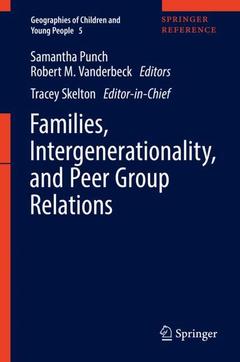Families, Intergenerationality, and Peer Group Relations, 1st ed. 2018 Geographies of Children and Young People Series, Vol. 5

This volume addresses children and young people?s relationships both within and beyond the context of the family. It begins with familial relationships and the home by examining the social and cultural complexities of families, intimacies and interdependencies, including the dynamics of families as spatial units (nuclear, multi-generational, alternative) and the roles that children play (as carers etc.). In addition to considering child/parent relations, sibling relationships and birth order, the initial section includes particular dimensions of children's familial relationships in diverse contexts, such as family food practices, aspirations and work practices.
The second section explores geographical dimensions of adult/child relationships beyond the dynamics of the family and across the lifecourse. It considers the roles that intergenerationality plays in children's and young people's lives as well as their links with wider communities. The section addresses broader conceptual issues and themes (child-adult relationships outside the home; intergenerational geographies and spaces; and the intergenerational city) while also providing more focused discussions of current issues related to the geographies of intergenerationality including adoption, looked after children and fertility.
The final section addresses children and young people's relationships with one another: friendship, peer group relations, and sexualities. It explores the geographies and spatialities of affective relations and emotional practices among children and young people. Geographies of bodies and embodiment and their connection to identities is an important part of this section. The chapters range from cross-cultural comparisons of age mixing among children to specific kinds of relationship formations between children and young people (e.g. friendship; sexual relations; gangs; bullying) and the spaces and places (including cyberspace) that facilitate, impede and organise these relationships. The diverse relationships that children and young people form with both one another and with adults have significant geographical dimensions.
Families, Intergenerationality, and Peer Group Relations: Introduction.- Sharing Spaces: Children and Young People Negotiating Intimate Relationships and Privacy in the Family Home.- Family Relations in Times of Austerity: Reflections from the UK.- Young Adults Living at Home: Independence, Intimacy, and Intergenerational Relationships in Shared Family Spaces.- Children’s Use and Control of Bedroom Space.- Negotiating Sibling Relationships and Birth Order Hierarchies.- Digital Technologies, Children’s Learning, and the Affective Dimensions of Family Relationships in the Home.- Everyday Family Food Practices.- Health Risks in the Home: Children and Young People’s Accounts.- Children’s Contributions in Family Work: Two Cultural Paradigms.- Intergenerational Relationships in Youth Activist Networks.- Intergenerational Communities as Healthy Places for Meaningful Engagement and Interaction.- Conflict, Empowerment, Resistance: Queer Youth and Geographies of Intergenerationality.- Generationing Educational and Caring Spaces for Young Children: Case of Preschool Bathroom.- Intergenerational Education and Learning: We Are in a New Place.- Children’s Agency and Welfare Organizations from an Intergenerational Perspective.- Contrasting Theories of Intergenerational Justice: Just Savings or Capabilities.- Children’s and Adolescents’ Peer Networks and Migrant Integration.- Sexuality and Intimacy: Adolescent Development in the Digital Sphere.- Young People in the Digital Age: Metrics of Friendship.- Cross-Cultural Research on Children’s Well-Being and the Generational Approach.- Ambivalence, Autonomy, and Children and Young People’s Belonging or not in Home Spaces.- Hybridity, Hyphens, and Intersectionality: Relational Understandings of Children and Young People’s Social Identities.
Samantha Punch is Professor of Sociology in the Faculty of Social Sciences and Dean of Graduate Studies at the University of Stirling, Scotland. Her research interests are within the sociology of childhood/youth and the sociology of development, including food practices in residential care; children’s work and education in Bolivia; the sustainable rural livelihoods in China, Vietnam and India; youth transitions and migration in Latin America; sibling relationships; young people’s problems in Scotland.
Her current interest in Childhood Studies is about how to move forward the theoretical and methodological debates via cross-world dialogue between the Majority and Minority Worlds (literatures which are often kept separate). In particular she is interested in processes of generationing and the relational aspects of power and agency within generational orderings. She is also currently working on a new research area regarding the card game of bridge; exploring the sociology of bridge including the social interactions of the game; gendered inequalities; learning across the lifecourse; and the potential links between bridge and delayed onset of dementia.She is author of Get Set for Sociology (2005, Edinburgh University Press) and editor of Sociology: Making Sense of Society (2013, Pearson), Global Perspectives on Rural Childhood and Youth (2007, Routledge), Children's Food Practices in Families and Institutions (2011, Routledge) and Children and Young People’s Relationships: Learning Across Majority and Minority Worlds (2013, Routledge).
Robert M. Vanderbeck is Professor of Human Geography and Head of the School of Geography at the University of Leeds. His research focuses on social difference, identities, relationships, and contemporary processes of social and legal exclusion. He has particular (often intersecting) interests in a) childhood, youth, and intergenerational relationships; b)
First text ever on Children’s and Young People’s Geographies
Easily digested information supported by high-quality illustrated material
Written by leading experts in the field
Includes supplementary material: sn.pub/extras
Date de parution : 02-2018
Ouvrage de 497 p.
15.5x23.5 cm



